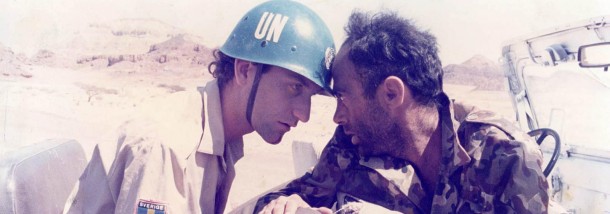
Dir.: Rafi Bukai | Cast: Salim Dau, Suhei Haddad, Barry Langford | Israel | 84 min.
Rafi Bukai’s directorial debut started out as a mere graduation film from the Department of Film Studies at the University of Tel Aviv, but has become a classic: The story of two Egyptian soldiers trying to find a way home in the last days of the Six Day War, is a turning point in Israeli film history. Bukai wrote and co-produced the film which had a recent renaissance at the Jerusalem Film Festival in 2016, where its 30th anniversary was celebrated with a brand new digital restoration copy. The two main actors were in attendance, as well as DoP Yoav Kosh and the widow of the director.
Set in 1967 in an expanded Israel, the Sinai peninsula, two Egyptian soldiers, Haled el Asma (Dau) and Gassan Hamada (Haddad), are trying to find a way back to Cairo. They are tired, hungry and thirsty – the last thing on their mind is fighting. Haled, who is an actor in civil life, tries to wow the Israeli soldiers with Shakespeare: “I am a Jew!” he shouts. “Hath not a Jew eyes?”. But his Shylock speech does not cut the mustard with the Israelis: “He’s got his roles confused”, says one of them. Luckily, the two Egyptians later discover an UN jeep containing a dead soldier and two bottles of whisky – as well as an umbrella. Defying their religious laws, the two drink the alcohol and stumble on with the umbrella, holding out against the burning sun, through the desert: Becket could not have staged it better. Later, they meet a British war correspondent (Langford), who is angry that the war is as good as over. He has come for blood and action, and is adamant to succeed: “The war will be over when I say the war is over”. Finally, the duo meet three Israeli soldiers who have given up by now, shooing the Egyptian soldiers away like mangy dogs, and together they sing “Avanti Populo”, the anthem of the Italian Communist Party. None of them understand the meaning of the words.
When AVANTI POPOLO was entered as the Israeli hopeful for the Academy Awards for Best Foreign Film in 1986, Ariel Sharon, ex-General and then Minister of Industry and Commerce, called it “a self-destructive portrait of inept Jews”. Sharon, like many others, obviously hankered back to the ‘good, olden days’ of Israeli cinema, when blond, blue-eyed Jews easily defeated ugly, hateful Arabs on the screen – evoking memories of the cinema of a certain Dr. Goebbels. Alas, thirty years on, AVANTI POPULO looks like Utopia: the current Israeli film landscape, like the political consciousness of the nation, is very much aligned with what went on before Bukai’s breakthrough. Isaac Zablocki, director of the Israeli Film Centre in NYC agrees: “There has been a significant drop in work which challenges the Status Quo. The tone of the current Cultural Ministry has made filmmakers, who are pitching and producing films with political content afraid. No one wants to be public enemy number One.”
DoP Yoav Kosh, debuting like Rafi Bukai, has made sure, that the images are sparse, the colours are washed out, there is little movement, everything is seen like in a feverish dream, the protagonist moving slowly forward through a mist of sand and sun. Rafi Bukai would only direct one more feature film (Marco Polo: The missing chapter, 1996), but he would produce the international success Life According to Agfa (1992), which won its director Assi Dayan (son of the general and war hero) a ‘Special Mention’ at the Berlin Film Festival. AS
SCREENING AT BERLINALE 2017 | CLASSICS SECTION | 9-19 FEBRUARY